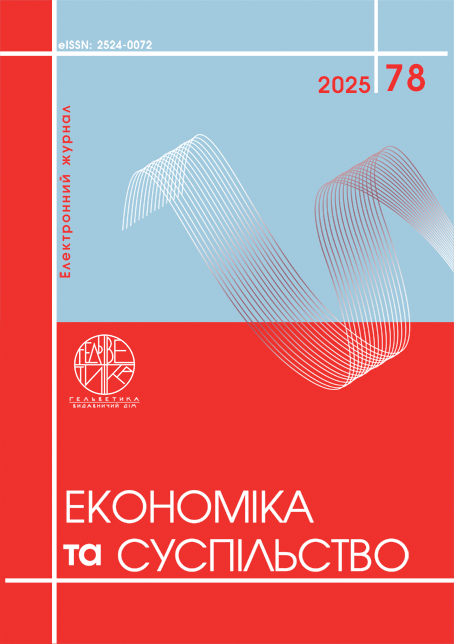ORGANIZATION OF ACCOUNTING FOR ENVIRONMENTAL RESPONSIBILITY OF AGRICULTURAL SECTOR ENTITIES
Abstract
The article considers the need to allocate accounting for environmental responsibility as a separate component of the accounting system of an agricultural enterprise. The environmental component is no longer just an expense element, but is transformed into a strategic asset that allows you to assess threats to future activities (for example, depletion of soil fertility), justify the transition to more resource-efficient and competitive business models (such as precision agriculture or organic production), and also form the added value of the brand as an environmentally responsible manufacturer. It is proven that traditional accounting, where environmental costs do not clearly find their place among general production costs, does not allow for an adequate assessment of their volume and efficiency. It is customary to include environmental costs, environmental income and environmental obligations as objects of environmental accounting of agricultural sector entities. It has been established that separate accounting provides transparency, allows you to accurately calculate the cost of production taking into account the environmental factor and turns environmental responsibility into a specific management object. It is characterized that this approach allows to form budgets of environmental protection measures, to analyze the effectiveness of "green" investments and to assess environmental risks. It is proved that, despite the problems of standardization, accounting for environmental responsibility is a key factor in ensuring the long-term sustainability and competitiveness of agricultural business. Accounting for environmental responsibility is the process of recognizing, assessing and reflecting in the accounting of all specific objects (costs, income, obligations) through which this responsibility is manifested. The system of accounting for environmental responsibility in the agricultural sector serves as a key tool for transforming traditional agriculture into sustainable, as it translates environmental risks and benefits into financial indicators. This provides management with an objective basis for making strategic management decisions.
References
Беренда Н.І., Остапенко Н.В. Розвиток екологічного обліку в Україні з врахування світового досвіду. Теоретичні та практичні аспекти стійкого розвитку фінансової системи України : кол. монографія. Умань: Візаві, 2013. Ч. 2. С. 205-214.
Голик В.Р. Управлінський екологічний облік як складова управління підприємством. Економічний форум. 2018. № 3. С. 240-243.
Гриценко О.І. Екологічний облік: визначення перспектив та основних засад упровадження. Економіка і суспільство. 2016. №2. С. 678-683.
Демко І.І. Екологічний облік як інструмент ефективної діяльності підприємства. URL: https://intersci.eu/wp-content/uploads/2023/02/Formation-of-ideas-about-the-position-and-role-of-science.pdf#page=17 (дата звернення: 15.08.2025).
Замула І.В., Шигун М.М. Аналітична модель бухгалтерського обліку екологічної діяльності. Вісник національного університету «Львівська політехніка». Менеджмент та підприємництво в Україні: етапи становлення і проблеми розвитку. Відп. ред. д.е.н., проф. Кузьмін О.Є. 2015. № 647. С. 337-343
Про бухгалтерський облік та фінансову звітність в Україні: Закон України від 16.07.1999 № 996-XIV. URL: https://zakon.rada.gov.ua/laws/show/996-14 (дата звернення: 18.09.2025).
Прокопишин О.С., Гнатишин Л.Б. Моделювання бухгалтерського відображення екологічної діяльності в системі обліку сільськогосподарських підприємств. Наукові праці Чорноморського державного університету імені Петра Могили комплексу «Києво-Могилянська академія». Серія : Економіка. 2016. Т. 275, Вип. 263. С. 78-83.
Сахно Л.А. Екологічний облік і аудит в реформуванні традиційної системи обліку на підприємстві. Облік і фінанси АПК. 2015. № 1. С. 89-92.
Свиноус І.В., Слободенюк О.І., Присяжнюк, Н.М., Гаврик О.Ю., Соколовський В.О. Теоретичні засади розвитку екологічного обліку. Агросвіт. 2021. № 15. С. 20-28.
Сорока Л.С. Розвиток екологічного обліку в контексті економічної безпеки. Збірник наукових праць Таврійського державного агротехнологічного університету (економічні науки). 2014. № 4. С. 287-293.
Berenda N.I., Ostapenko N.V. (2013). Rozvytok ekolohichnoho obliku v Ukraini z vrakhuvannia svitovoho dosvidu [Development of environmental accounting in Ukraine taking into account world experience] Teoretychni ta praktychni aspekty stiikoho rozvytku finansovoi systemy Ukrainy – Theoretical and practical aspects of sustainable development of the financial system of Ukraine: kol. monohrafiia. Uman: Vizavi. Ch. 2. pp. 205-214. (in Ukrainian)
Holyk V.R. (2018). Upravlinskyi ekolohichnyi oblik yak skladova upravlinnia pidpryiemstvom [Management environmental accounting as a component of enterprise management]. Ekonomichnyi forum – Economic Forum. vol. 3. pp. 240-243.
Hrytsenko O.I. Ekolohichnyi oblik: vyznachennia perspektyv ta osnovnykh zasad uprovadzhennia [Environmental accounting: determining prospects and basic principles of implementation]. 2016. Ekonomika i suspilstvo – Economy and society. vol. 2. pp. 678-683.
Demko I.I. Ekolohichnyi oblik yak instrument efektyvnoi diialnosti pidpryiemstva [Environmental accounting as a tool for effective enterprise activity]. Available at: https://intersci.eu/wp-content/uploads/2023/02/Formation-of-ideas-about-the-position-and-role-of-science.pdf#page=17 (accessed: 15.08.2025).
Zamula I.V., Shigun M.M. (2015). Analitychna model bukhhalterskoho obliku ekolohichnoi diialnosti. [Analytical model of accounting for environmental activities]. Visnyk natsionalnoho universytetu "Lvivska politekhnika". Menedzhment ta pidpryiemnytstvo v Ukraini: etapy stanovlennia i problemy rozvytku – Bulletin of the National University "Lviv Polytechnic". Management and Entrepreneurship in Ukraine: Stages of Formation and Problems of Development. Deputy Editor-in-Chief, Doctor of Economics, Prof. Kuzmin O.E. vol. 647. pp. 337-343.
Verkhovna Rada of Ukraine (1999). On accounting and financial reporting in Ukraine (Law of Ukrain No. 996-XIV, July 16). Available at: https://zakon.rada.gov.ua/laws/show/996-14 (accessed:18.09.2025) [in Ukrainian]
Prokopyshyn O.S., Hnatyshyn L.B. (2016) Modeliuvannia bukhhalterskoho vidobrazhennia ekolohichnoi diialnosti v systemi obliku silskohospodarskykh pidpryiemstv [Modeling of accounting reflection of environmental activity in the accounting system of agricultural enterprises]. Naukovi pratsi Chornomorskoho derzhavnoho universytetu imeni Petra Mohyly kompleksu "Kyievo-Mohylianska akademiia". Seriia : Ekonomika.- Scientific works of the Petro Mohyla Black Sea State University of the "Kyiv-Mohyla Academy" complex. Series: Economics. Vol. 275, Issue 263. P. 78-83.
Sakhno L.A. (2015). Ekolohichnyi oblik i audyt v reformuvanni tradytsiinoi systemy obliku na pidpryiemstvi [Environmental accounting and audit in reforming the traditional accounting system at the enterprise]. Oblik i finansy APK - Accounting and Finance of the Agricultural Industry. vol. 1. pp. 89-92.
Svynous I.V., Slobodeniuk O.I., Prysiazhniuk, N.M., Havryk O.Yu., Sokolovskyi V.O. (2021). Teoretychni zasady rozvytku ekolohichnoho obliku [Theoretical foundations of the development of ecological accounting]. Ahrosvit - Agrosvit. vol. 15. pp. 20-28.
Soroka L.S. (2014). Rozvytok ekolohichnoho obliku v konteksti ekonomichnoi bezpeky [Development of environmental accounting in the context of economic security]. Zbirnyk naukovykh prats Tavriiskoho derzhavnoho ahrotekhnolohichnoho universytetu (ekonomichni nauky) – Collection of scientific works of the Tavria State Agrotechnological University (economic sciences). vol. 4. pp. 287-293.


